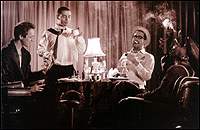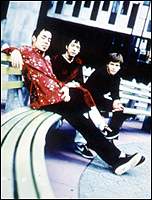by Lissa Townsend Rodgers and Andrew Clevenger
| |
 MC Lyte MC Lyte
"Seven & Seven"
(Eastwest)
A heavy metal guitar spews out a solo "Star-Spangled Banner" and the crowd "oooooh"s as Missy Elliott puts down the royal pronouncement-- "Int-tro-ducing, MC Lyte." And when the lady herself appears, what does she say? "Alright, now gimme the 808." And 808 is what we get from "Seven & Seven," because MC Lyte is taking the high road: rather than rip off the new kids on the block, as many of rap's elders have done, MC picks up the books and heads back to the old school. There's no '80s samples, no designer-name flaunting (except for the occasional top-shelf brand), no interminable spoken interludes, nothing Puffy or Wu about it.
In fact, the album's high points come courtesy of back-in-the-day master Milk Dee. He produces and kicks in a verse on "This MC," in which Lyte's flow quotes such grade school fare as "Nick, knack, paddy wack" and "Good Ship Lollipop," dropping a dollop of "Bring the Noise" for good measure over a primal beat backing. The two also collaborate on a cover of Audio Two's classic "Top Billin'," duetting and duelling over another solid beat, the only ornamentation some barely-audible crowd chanting. Milk also produced the record's one bit of narration, "Assaholics Anonymous," providing a jazzy backup for D Knowledge's Last Poets-ripoff rant about men who love that ass too much.
The aforementioned Miss Misdemeanor also does up a few tracks (for the record, Lyte did "Cold Rock A Party" with Missy years ago, so this isn't a trend thing). Aside from the percolating beat and cinematic sound effects of the opener, "My Business," she puts a low-key polish on "Too Fly," which features a slow jam chorus from one of the Total girls and contrasted acoustic guitars and casiotone blips. Most of the interest in "Want What I Got" comes from the "it's my world" diva tale-swapping between Lyte and Missy, with an ear-grabbing hook from Lil' Kim imitator Mocha.
On the whole, "Seven & Seven"'s arrangements are pretty spare--a beat, maybe some low-key bass or "Le Freak"-ish single-string guitar picking, the occasional glissando of bells or crowd shout and, of course, that 808. "Party Goin' On" is one of the most dolled-up cuts, with its double-tracked rap and several guest divas roaring and swooping over a churning funk backdrop, giving us the highlights of a post-show hotel room shindig.
"Seven & Seven" is a wise record, its blend of back-to-basics style with a bounty of up-and-comer guest appearances provides crowd-pleasers for both the old mack and new jack. However, I've said it before and I'll say it again: albums do not need to be 77 minutes long!
--Lissa Townsend Rodgers
|
|
|
 Marc Ribot y Los Cubanos Postizos Marc Ribot y Los Cubanos Postizos
"Marc Ribot y Los Cubanos Postizos"
(Atlantic)
The Latin tinge seems to be this year's musical flavor. Jazz-wise, artists from Roy Hargrove to Jane Bunnett have pulled together Afro-Cuban-laced ensembles. In rock, Hispanic acts such as Plastilina Mosh and Ozomatli have pulled down major-label paychecks. But with all this fusion and confusion going on, the most intriguing mix of Latin with both jazz and rock comes from downtown guitar stalwart Marc Ribot and his new Cubanos Postizos outfit. Virtually all of the songs were written by Cuban composer Arsenio Rodriguez before 1950, but Ribot reworks them in a variety of directions, from lounge dirge to muzak bounce, with guitar embellishments that move from noise to flamenco.
"Los Cubanos Postizos" opens slowly--it's clearly a fully thought-out album, with attention given to the material's arc and the listener's emotions. The record opens with the beautiful, balladic, "Aurora En El Pekin," delivered in a hushed, minimal fashion. The follow-up is still quiet, but faintly whimsical in its oddly Sergio Mendes & Brazil 66 sound. Up next is the giddy "Coma Se Gozo En El Barrio," which intermittently channels a mariachi band and a hotel bar's electric piano while offering a variety of twists on that legendary "Tequila" riff. "Postizos," the one track authored by Ribot, opens with congas that are promptly blown out by guitar screech, which grinds out and over a pounding backdrop and a bit of call-and-response vocalizing. Then a few more upbeat tracks, another noisy one, something sorta festive, and we're lulled out by the quiet shimmer of maracas and guitar on "Esclavo Triste"--still, Ribot leaves us with one last giggle in the head-bobbing, horn-peppered "Choserito Plena."
Ribot's wit has a lot to do with what keeps this record from being another exercise in the indigenous--the languid pace and fluid, minimal guitar of "La Vida Es Un Sueno" might be dull if it weren't for his broken-down lounge singer bad Spanish declaiming. In "Los Teenagers Bailan Changui," a Hammond Organ echoes the guitar through its twists and turns, ascensions and descensions, takes a deceptive break during a solo, and suddenly springs ahead, leaving the six-string in its wake, trying vainly to catch up before the fade out.
Ribot seems to have happened on a mix that, while it seems like it wouldn't work, actually tickles the fancy of many: Downtown Knitting Factory hipsters usually don't score major-label releases and Los Cubanos Postizos have opened for everyone from James Carter to Jonathan Fire Eater. When stretching your horizons usually means jeopardizing your market share, it's nice to see Ribot willing to take the gamble and able to cash in.
--Lissa Townsend Rodgers
 Fastball Fastball
"All the Pain Money Can Buy"
(Hollywood Records)
Don't let the title fool you: Fastball's "All the Pain Money Can Buy" is actually a very pleasurable listening experience. The Austin-based trio's sophomore outing is full of musical exuberance and hipster style. With their Green Day-meets-Stevie Ray aesthetic--bassist Tony Scalzo is a refugee from the California punk scene and guitarist Miles Zuniga was reared in Laredo, Texas--and songs like "Better Than It Was" and "Warm Fuzzy Feeling," Fastball bears a striking sonic resemblance to Elvis Costello on prozac.
But wait, it's not all peace, love, and harmony--there are some pretty shady ideas at play behind the pop hooks. (After all, the band thanks both Hunter S. Thompson and Matthew Sweet in the liner notes.) The first single, "The Way," is about an elderly couple in an RV that never makes it to the nearby family reunion. "Slow Drag" finds the cigarette-puffing narrator plotting a murder: "I want to see you dead/Laying in the muddy ground," sings Zuniga with alarming conviction. Junkies, optimists, slackers, and romantics all get a fair shake from Fastball.
Scalzo and Zuniga are both talented songwriters, but their contributions to each other's songs are what sets "All the Pain" apart from run of the mill alt-rock. Scalzo's buoyant bassline keeps Zuniga's carefree "Fire Escape" bouncing merrily along, while Zuniga delivers a quietly powerful solo (sounding uncannily like vintage George Harrison, circa "Rubber Soul") on Scalzo's meditative "Out of My Head." Add Joey Shuffield's tasteful drumming, and you've got one damn fine album, and there's nothing painful about that.--Andrew Clevenger
Send feedback here.
|
|
|

